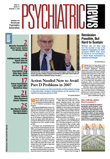On a county-by-county basis, higher levels of prescribing of SSRI antidepressants are associated with lower rates of suicide among youth aged 5 to 14. Yet the clinical significance of this finding is being debated (see article at left).
The findings, which are reported in the November American Journal of Psychiatry, are similar to those in the majority of research reports published over the last several years that have looked for an association between antidepressant medications and an increased risk of suicidal thoughts or behaviors (which the U.S. Food and Drug Administration collectively labels“ suicidality”), serious suicide attempts resulting in the need for emergency medical intervention, or actual suicides. Also, several observational or ecological studies have found inverse relationships between high rates of SSRI prescribing and suicide attempts or suicides in adults or older adolescents.
The findings from the new study, however, run counter to those of other studies that have found an increased risk associated with the medications, particularly in young patients. In addition, a major FDA meta-analysis of clinical trials data also found on average a twofold increase in risk of suicidality in children and adolescents who take antidepressants.
What is noteworthy about the new study is that the authors focused their analysis on the youngest cohort of patients reported on so far. In addition, in analyzing the current data, the researchers used complex statistical methods in an attempt to minimize known potential biases associated with several common, yet confounding, factors.
Robert Gibbons, Ph.D., a psychiatric epidemiologist and director of the Center for Health Statistics at the University of Illinois at Chicago, teamed with colleagues at the university and youth-suicide experts at Columbia University's College of Physicians and Surgeons. The work was funded primarily by grants from the National Institute of Mental Health.
Gibbons and his colleagues, including J. John Mann, M.D., a professor of psychiatry and radiology at Columbia and chief of psychiatric research in the Division of Neuroscience at the New york State Psychiatric Institute, analyzed county-level suicide data gathered by the Centers for Disease Control and Prevention from 1996 through 1998. The database included all reported suicides for each county in all 50 states, with each suicide identified by sex, race, and age.
The researchers compared the three years of county-level suicide data with concurrent county-level antidepressant prescription dispensing data from IMS Health Inc., a U.S.-based global health care data firm. The researchers noted that the data were obtained from IMS with the assistance of a grant from Pfizer Inc. However, they added, Pfizer played no part in study design, data analysis, or preparation of the report. In addition, Mann reported research support from GlaxoSmithKline and disclosed that he has served as an advisor to Lilly and Lundbeck. (All three companies market antidepressant medications.) Gibbons, as well as the remaining co-authors, reported no competing interests.
Gibbons, Mann, and colleagues used a random sample of dispensing data from 20,000 pharmacies in the IMS database. The data did not include hospital pharmacies or mail-order facilities. For each county, data were obtained for the SSRI antidepressants citalopram, paroxetine, fluoxetine, fluvoxamine, and sertraline.
The researchers found that there were 933 suicides among children aged 5 to 14 from 1996 through 1998, corresponding to an overall annual rate of 0.8 per 100,000 population.
The suicide rate varied, however, by the number of SSRI prescriptions by county.
The counties with the highest rate of SSRI prescribing had the lowest suicide rate (0.7 per 100,000). The counties with the second-lowest rate of SSRI prescriptions had the highest suicide rate (1.7 per 100,000).
The SSRI effect remained highly significant, even after the researchers corrected for potential confounding factors, including sex and race, as well as for two important factors potentially affecting patients' access to quality mental health care: income and the number of psychiatrists and child psychiatrists in each county. (Physician data were obtained from the AMA's Physician Master File.)
Gibbons and his colleagues noted in their report that “the aggregate nature of these observational data precludes a direct causal interpretation of the results... and may reflect antidepressant efficacy, treatment compliance, better quality of mental health care, and low toxicity in the event of a suicide attempt by overdose.”
“The Relationship Between Antidepressant Prescription Rates and Rate of Early Adolescent Suicide” is posted at<www.ajp.psychiatryonline.org/cgi/content/full/163/11/1898>.▪
